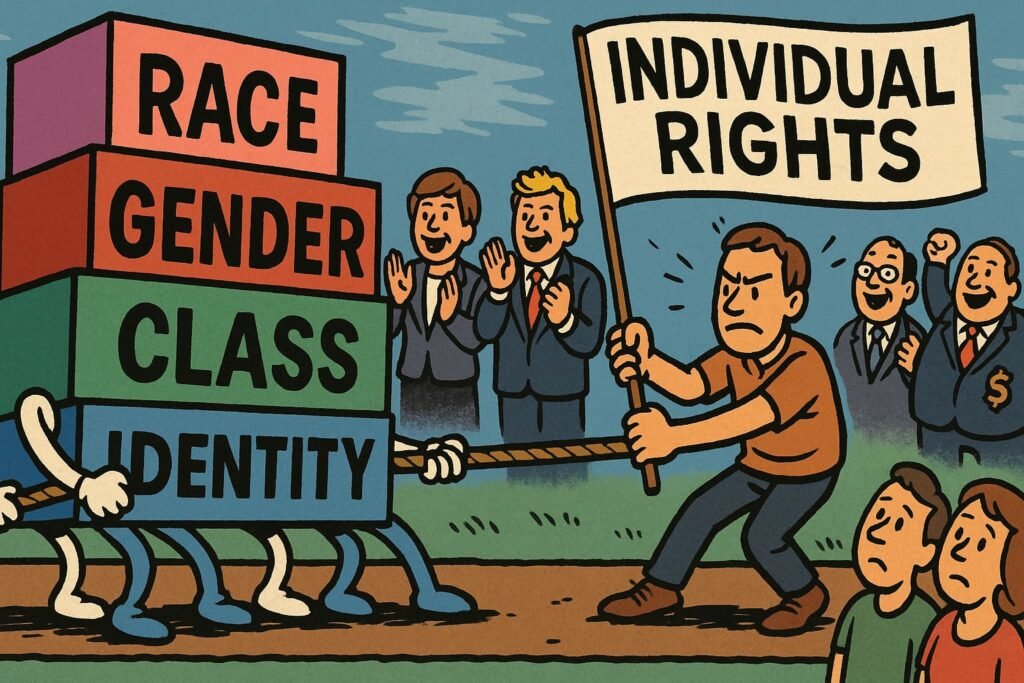Collectivism vs Individualism Explained – The Hidden Fault Line
Forget left vs right, socialism vs capitalism, even Labour vs Conservative. The real battle shaping today’s politics is simpler: collectivism vs individualism.
On one side: collectivism, which says people are defined by their group — race, gender, class, sexuality. On the other: individualism, which insists people are defined by themselves — their choices, rights, and freedoms.
Modern woke politics is firmly in the collectivist camp. It doesn’t see citizens, it sees categories. It doesn’t ask what you think, but which box you tick.
Table of contents
Collectivism: You Are Your Group
Collectivism works like this:
- Society = oppression. Groups are locked in power struggles.
- Identity = destiny. You don’t just have opinions, you represent your category.
- Justice = group equality. Forget universal rights — what matters is balancing outcomes between collectives.
This is why “equity” replaced “equality.” Equality treats everyone as individuals. Equity divides people into groups, then redistributes until the spreadsheets look fair.
It’s also why activism demands quotas, speech codes, and recognition rituals. It’s not about you. It’s about your group.
Individualism: You Are Yourself
Individualism flips that logic:
- Rights belong to people, not categories.
- The law should be universal. Everyone gets the same protection, regardless of identity.
- Freedom = autonomy. You are not your race, sex, or orientation. You’re a citizen.
This is the tradition that built liberal democracies. The idea that no matter where you come from, you’re equal before the law. No special privileges, no special penalties.
To collectivists, that sounds naïve. To individualists, it’s the only way to stop politics turning into a permanent scoreboard of oppression.
Woke Politics: Collectivism in Action
Look around and you’ll see collectivism everywhere:
- Workplaces: HR departments treating employees as diversity metrics, not professionals.
- Universities: speech codes and identity-based bureaucracies enforcing conformity.
- Politics: laws bent to satisfy activist groups rather than citizens at large.
- Media: outrage headlines about words and categories, not policies or results.
The message is always the same: you don’t speak as yourself, you speak for your group.
Why Collectivism Wins in the Current System
Collectivism has an advantage: it’s useful to those in power.
- Politicians love it because carving society into groups lets them build voting blocs.
- Corporations love it because branding diversity is cheaper than raising wages.
- Academics and NGOs love it because endless subgroups mean endless careers analysing them.
The more categories, the more power flows upward. Ordinary people get divided; elites get stronger.
The Cost of Losing Individualism
When collectivism dominates, society changes:
- Law becomes selective. Hate-speech codes punish one group more than another.
- Merit gets replaced by quotas. Identity counts more than ability.
- Debate dies. Disagree with the narrative and you’re betraying your group.
- Personal responsibility evaporates. Failures are someone else’s fault — the system, history, colonisation.
The individual — the one thing that can’t be subdivided — becomes invisible.
The Choice Ahead
Every woke slogan — equity, inclusion, systemic oppression — is just collectivism in disguise. It tells you your rights, your voice, your future, all depend on which group you belong to.
Individualism says the opposite: that you matter on your own terms, not as part of a managed category.
The real question is this: do we want a society of free citizens, or a spreadsheet of identity boxes?
👉 Want the bigger picture on how power really works? Visit our Politics of Power Explainer Hub to see how leaders, corporations, and ideologies battle for control.
FAQ: Collectivism vs Individualism
Q: What’s collectivism in simple terms?
It’s the idea that people are defined by their group identity, not as individuals.
Q: What’s individualism?
The belief that rights and freedoms belong to each person equally, not to categories.
Q: Why does woke politics side with collectivism?
Because it fits Critical Theory’s worldview — society as power struggles between groups.
Q: Who benefits from collectivism?
Politicians, corporations, academics, and NGOs who gain influence by managing groups. Ordinary individuals lose.
Q: Why does this clash matter today?
Because it explains culture wars, quotas, identity politics, and why debate over universal rights has been replaced by endless group grievances.



